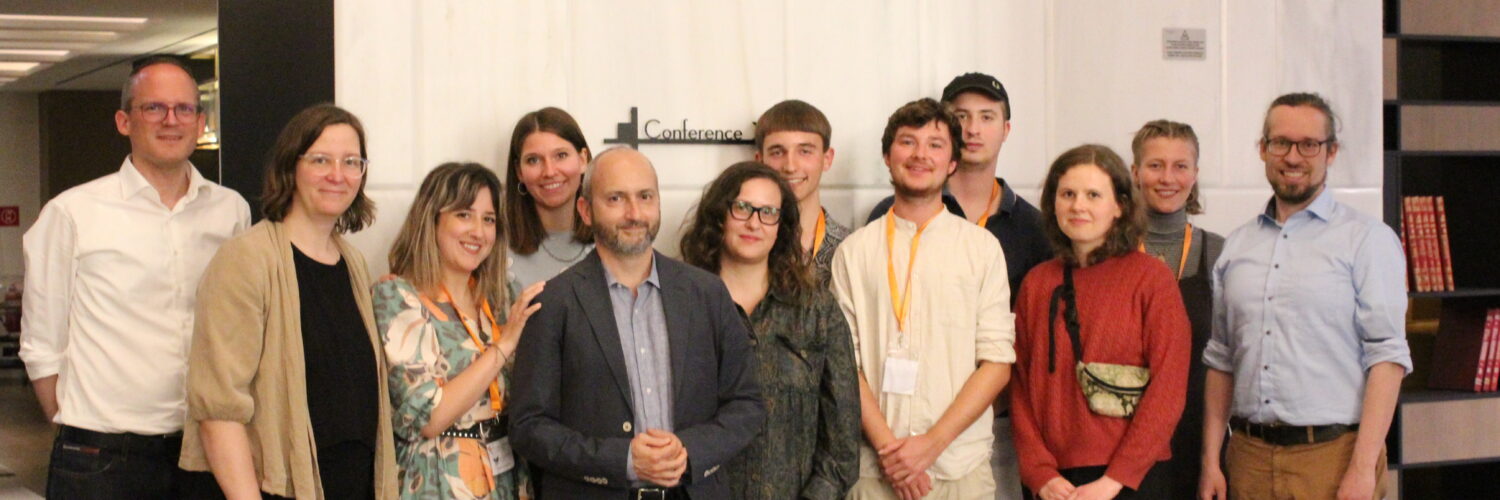By Ronja Troger
EUROPEAN YOUTH
Johannes: Do you have any ideas or solutions for addressing the high youth unemployment rate in Greece at a European level?
Silke Gebel:The most important issue is ensuring that young people have guaranteed access to education and free educational opportunities beyond school. The European Union should ensure that education doesn’t end with secondary school; there should be accessible options for further training, whether at universities or other professional levels. For example, Germany offers a highly professionalized non-university job training system that could serve as a model. Additionally, with a youth unemployment rate of 25%, it’s evident that the labor market is not sufficiently open to young people. The EU needs to engage in discussions with national governments to ensure better integration of young people into the labor market, as prolonged unemployment can have detrimental effects on an entire generation.
Johannes: In October 2023, there were rumors that the Goethe Institut might close some departments in ten cities across Europe, including the one in Thessaloniki. Do you have any updates on whether this will actually happen? There has been significant criticism surrounding these potential closures. What are your thoughts on this situation?
André Schulze: We are currently engaged in intense negotiations regarding the budget allocations for various ministries in Germany, including the foreign ministry, which funds the Goethe Institut. As part of these discussions, there are plans to potentially close some departments in several cities. We don’t have a definitive update yet, as the new budget for 2025 is still under discussion and is expected to be finalized in parliament by November or December of this year. Until then, there will be no concrete decisions or assurances.From a political standpoint, it’s clear that in a time when we are having significant debates about democracy and European integration, institutions like the Goethe Institut are crucial and should not be closed. These institutions, along with others like the Friedrich Ebert Foundation and the Heinrich Böll Foundation, play a vital role in promoting cultural exchange and perspectives within the EU. They are essential for the democratic development of Europe and for fostering a sense of community among its societies.
Johannes: How can we ensure that youth programs are accessible to a diverse range of young people, including those from vulnerable groups, not just university students?
Silke Gebel: Since I was 14, I’ve been involved in youth policy at the European level, and we’ve always asked how to make programs more accessible to young people from diverse backgrounds, not just university students. To improve access, we should collaborate with chambers of commerce and trade, such as Germany’s Chamber of Crafts. This would help integrate skilled workers into these programs, reviving the tradition of international exchange to learn new techniques, which historically fostered innovation. Additionally, we need to address the scheduling conflicts that prevent non-university youth from participating in exchanges. Employers should be encouraged to allow time for these opportunities, and funding should be provided, especially since these young people often lack financial support from their families. The EU could enhance promotion through targeted social media campaigns on platforms like TikTok. Moreover, members of parliament should visit schools to inform students about the benefits of participating in international exchanges, particularly those unsure of their next steps after graduation.
ENVIRONMENTAL ISSUES
Ronja: What is your impression of Athens regarding its bicycle lanes and green spaces?
André Schulze: Yesterday, we walked from the German ambassador’s residence to our hotel and struggled to find bicycle lanes. The sidewalks were also in poor condition, with obstacles like trees blocking the path, making it difficult for both pedestrians and wheelchair users. While the metro and bus systems seem acceptable, we didn’t test them extensively. We discussed with the prime minister the need for better investment in public transport. Specifically, the rail connections from Sofia to Athens are problematic, highlighting the need for improved train services. Good rail infrastructure could reduce the need for numerous flight connections within Greece, particularly between Thessaloniki and Athens. Overall, there is significant potential to enhance public transport and bicycle infrastructure in Athens.
Ronja: Recently, there has been criticism of the Greens for shifting from a radical left-wing stance to a more centrist position in government, particularly evident in the RWE deal and the eviction of Lützerath. As a party member, how do you view this shift in the party’s direction?
Silke Gebel: When we were last in federal government, similar debates occurred over issues like nuclear power and citizenship reform. Critics often resurface when compromises are made, but during the 18 years of Angela Merkel’s leadership, little progress was made on these fronts. The Greens, despite criticism, work daily to combat climate change and push for progressive societal changes.
Regarding the Lützerath eviction, while I understand the frustration from long-time activists, the compromise achieved has led to RWE shutting down coal mines earlier than planned. The symbolic cost, including the destruction of Lützerath, was part of the deal. In government, sometimes compromises are necessary to achieve some positive outcomes, even if they come with difficult trade-offs.
Despite having only 15% representation, the Greens strive to secure better results within the coalition. We must continue to unite against climate change and engage more citizens in this fight. Recent Berlin elections highlighted the challenges we face, as the conservatives won by downplaying climate issues.
André Schulze: We’ve had extensive internal discussions about issues like Lützerath and recent changes to climate laws, such as the removal of specific goals for the mobility sector. Germany continues to miss its climate targets, especially in transport and heating. There’s been debate within the party about whether to leave the government over these issues. Currently, the decision is to stay in government due to uncertainty about the FDP’s stance on upcoming budget negotiations, which are crucial for funding climate initiatives like heat pumps and e-mobility programs.
EUROPE AND REFUGEES
Lorenz: What are your thoughts on the current developments at the EU level regarding refugee and migrant rights?
André Schulze: The refugee and migrant rights reforms at the EU level are highly controversial within the German government and the Green Party. Our European Parliament group opposed the reforms, believing they’re not the right approach for the EU. However, the German government supported them in the council, preferring an agreement on refugee distribution despite its flaws. I remain skeptical about the effectiveness of these new distribution rules and will closely monitor how they are implemented and how German procedures evolve. Overall, we have been critical of the reforms.
Lorenz: Given the human rights violations reported in Libya, Tunisia, and Egypt, should the EU reconsider its agreements with these countries, which aim to prevent refugees from reaching Europe?
Silke Gebel: The EU’s commitment to its values of democracy, human dignity, and rule of law should extend to its external agreements, not just within its borders. The EU has historically aimed to create stability in neighboring regions to address the root causes of migration. However, negotiating with countries that violate human rights and the rule of law is problematic. While dialogue with these nations is necessary, it’s crucial that the EU upholds its values in these agreements. If not, it risks undermining its principles and failing to drive positive change in these countries.
André Schulze: In Germany, the debate on refugee policies has shifted rightward, with some conservatives advocating extreme measures like the UK’s Rwanda model. As a left-leaning party, we need to work with others across the political spectrum to counter this shift and promote more humane policies.
Silke Gebel: Germany is unique in its extensive debate over refugee responsibility and distribution compared to other major EU countries. When a recent decision was made, Germany was joined by only two other countries in opposing it, while others like France, Spain, and Portugal did not. This indicates a need to shift the debate across all EU countries to better align with progressive values. This is a concern as we approach the upcoming European elections.
GERMAN AND GREEK RELATIONS
Johann: What are your thoughts on Germany paying reparations to Greece for war crimes committed during WWII, and are there alternative ways to address this issue besides financial compensation?
Silke Gebel: Germany must take responsibility for its historical actions, and it’s crucial to address the past openly, including discussions about reparations. While I’m not deeply versed in the specifics of past and current debates, it’s important that Germany listens to Greece’s concerns and engages in meaningful dialogue about the war’s legacy. Beyond reparations, Germany has a duty to come to terms with its history, learn from it, and strengthen democracy to ensure “Never Again” is a lived reality. As eyewitnesses from that era pass away, it becomes even more important to reflect on these lessons and actively work to prevent the dehumanization and erosion of democratic values seen during the dictatorship.
Johann: Many Germans are unaware of the Holocaust and war crimes in Greece. Are there any projects in Germany addressing this issue, and what ideas do you have to enhance remembrance culture?
André Schulze: I’m not aware of specific projects focused on Greek war crimes, but existing remembrance infrastructure, like Berlin’s “Topographie des Terrors,” could benefit from special exhibitions on war crimes across Europe. Notably, the Imperial War Museum in London offers a compelling Holocaust exhibit with maps of concentration camps across Europe, including Greece. Such comprehensive, ongoing exhibitions are crucial to ensuring that all aspects of the Holocaust, including Greek and Balkan atrocities, are remembered and studied.









Add comment